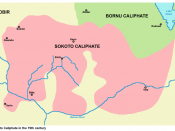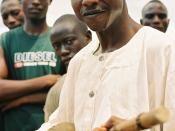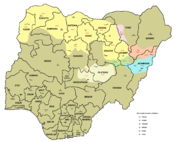Introduction
Nigeria is a country located on the coast of western Africa. It has an area of 356,669 square miles (923,768 square km). It is bordered to the north by Niger, the east by Chad and Cameroon, the south by the Gulf of Guinea, and to the west by Benin. Nigeria is not only large in size--it is larger than the U.S. state of Texas--it is also Africa's most populous country. However, Nigeria's most diverse feature is its people. More than 400 languages are spoken, including Yoruba, Igbo, Fula, Hausa, Edo, Ibibio, Tiv, and English. The country has abundant natural resources, notably large deposits of petroleum and natural gas.
The economy
The Nigerian economy is one of the largest in Africa. Since the late 1960s, it has been based primarily on the petroleum industry. A series of world oil price increases from 1973 produced rapid economic growth in transportation, construction, manufacturing, and government services.
Because this led to a great shifting of rural people into the larger urban centres, agricultural production stagnated to such an extent that cash crops like palm oil, peanuts (groundnuts), and cotton were no longer significant export commodities; in addition, from about 1975 Nigeria was forced to import such basic commodities as rice for domestic consumption. This system worked well as long as revenues from petroleum remained constant, but since the late 1970s the agricultural sector has been in continuing crisis because of the fluctuating world oil market. Although much of the population remained engaged in farming, too little food was produced, requiring increasingly costly imports. The various governments (most of them military-run) have dealt with this problem by banning agricultural imports and by focusing, albeit briefly, on various agricultural plans. In the late 1990s the government shifted its policy toward privatizing many state-run enterprises--especially in...


